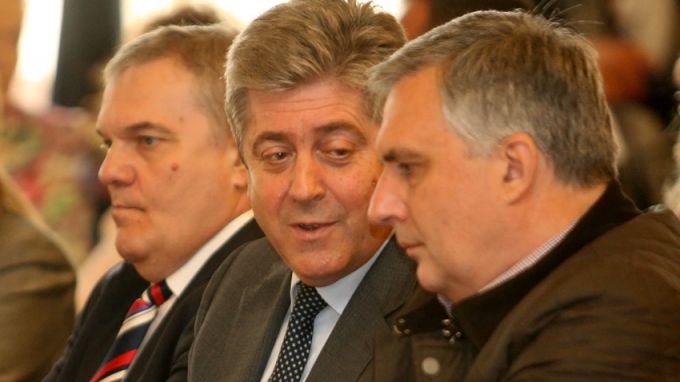
During a decisive day of consultations between coalition partners on the presidential veto on changes to the Election Code, the centre-left Alternative for Bulgarian Revival (ABV) announced it was withdrawing support from the government. Deputy Prime Minister and Labour Minister Ivaylo Kalfin, representative of the formation in government, also resigned. About a month ago the party threatened to withdraw as a sign of disagreement with the amendments to the Election Code, but recent consultations made it clear that it would accept the arguments of the presidential veto. Apparently, it was not disagreement on the Election Code that led to the withdrawal of support.
After the withdrawal of Alternative for Bulgarian Revival, the government now can count on 114 votes in parliament, which is below the minimum of 121 needed for a majority. However, Kalfin's resignation was accepted by Prime Minister Borissov immediately while the Reformist Bloc expressed satisfaction that the only left party which used to be part of the ruling coalition had decided to leave it.
Speaking about the presidential veto a few days ago, the Prime Minister said that it put at risk the stability of the ruling majority and the government. Now the majority has been lost as a result of something else and PM Borissov has to choose between preparations for early elections and continuing to rule together with GERB, the Patriotic Front and the Reformist Bloc, relying on the support of the Bulgarian Democratic Centre, that holds 14 seats in parliament. It is possible that the government could rely on the support of six members of the breakaway DOST party but one should keep in mind that DOST and the Patriotic Front are openly hostile to each other.
Paradoxically, the withdrawal of Alternative for Bulgarian Revival strengthens the position of Democrats for Strong Bulgaria /DSB/, which is part of the Reformist Bloc coalition. Despite being part of this coalition, about a year ago DSB also withdrew its support for the government and now the PM should be more concerned about DSB’s position
The withdrawal of ABV from the centre-right government will probably have its effects on the left political space. Representatives of the Reformist Bloc and the Patriotic Front found a link between the unexpected decision of ABV and the plans of the new leader of the Bulgarian Socialist Party, Kornelia Ninova, to restructure and unify the left space in the country and to form a center-left government. Currently, BSP denies this link but there are reasons that make it seem plausible. In her first speech in parliament after her election as President of the Bulgarian Socialist Party, Ninova said the ship was sinking and the crew members were leaving because it was “time for an alternative, which comes from the BSP and the left space.”
There are other possible explanations for the withdrawal of ABV from the government. For example it coincides with the beginning of preparations for the upcoming autumn presidential elections. At the end of March, when asked if he would participate as a candidate in the upcoming presidential elections, ABV head Georgi Parvanov said that he would not be seen running for vice president. Now, a month and a half later, Parvanov stays silent.
English: Alexander Markov
The decision for Bulgaria's full membership in the Schengen area from the beginning of 2025 is a historic event both for the country and for relations with neighboring EU countries – Romania and Greece. What is the defining event in..
Making sense of the events from one whole year succinctly is, without doubt, a challenge, especially if we are talking about politics. The early elections for parliament, that have become something of a tradition in this country, took voters to the..
Romania closes dozens of border check points as of 1 January In connection with its full accession to the Schengen area, as of 1 January, 2025, Romania is closing more than 30 border check points on its borders with Bulgaria and Hungary, Radio..
The economic and financial debate is key for the current European Parliament session . This is the opinion of Bulgarian MEP from the European People's..
Bulgaria must receive targeted defense funding. This is what Bulgarian MEP from the European People's Party Andrey Novakov has requested from the new EC..
Europe must become powerful again. This was stated by MEP Sandro Gozi from Renew Europe, former Italian Secretary of State for European Affairs in..

+359 2 9336 661
